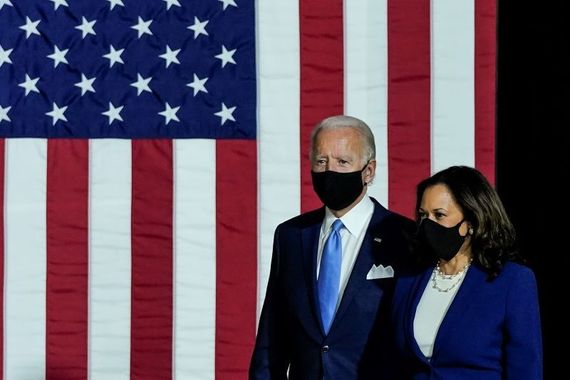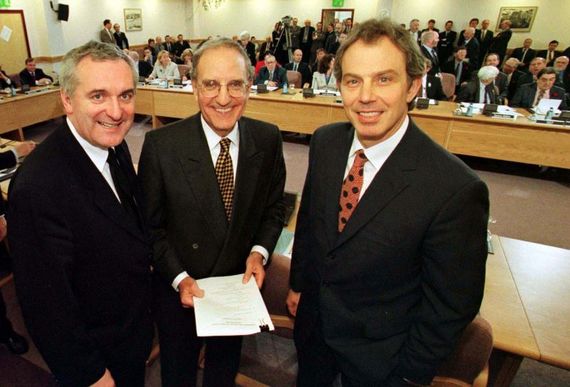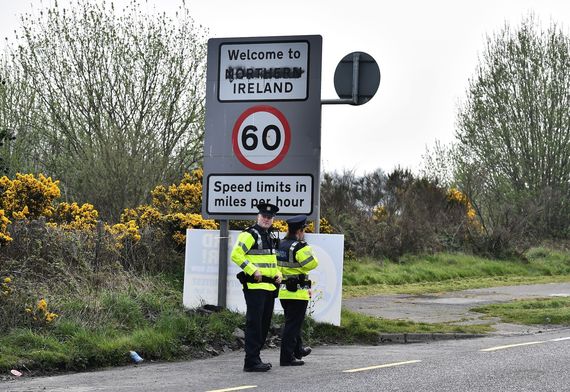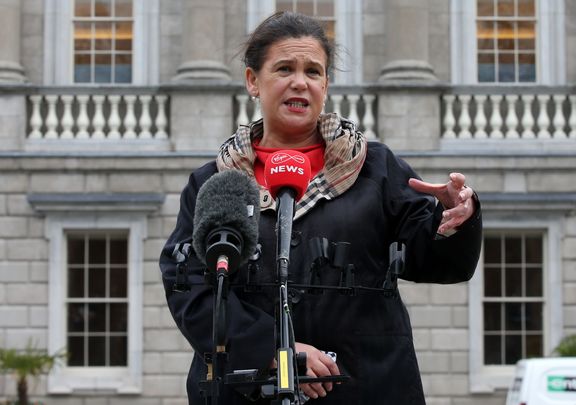This article was submitted by the President of the political party Sinn Féin Mary Lou McDonald as an op-ed following the publicity their United Ireland campaign received over the St. Patrick's Day period.
This year, due to Covid restrictions, St. Patrick’s Day celebrations have been canceled. While the parades were halted politics marches on with statements from Congressional leaders and a bipartisan resolution introduced by Senators Bob Menendez and Susan Collins in support of the Good Friday and subsequent agreements.
President Biden and Vice President Harris made clear that the Good Friday Agreement was the only show in town, and agreements needed to be safeguarded and implemented in full.
Ireland remains a political concern for America. For that we are grateful. The U.S. has been with Ireland every step of the way from conflict to peace. We measure change and progress by how far we have come and also how far we have yet to travel.

President Joe Biden and Vice President Kamala Harris.
One hundred years ago the British government imposed partition on Ireland. A new parliament was established in the northeastern six counties, sectarian pogroms were the order of the day.
In the rest of Ireland, Irish rebels were fighting a war against the British forces. The rebels would win independence at the cost of the division of Ireland.
Two conservative, homogenous states emerged. Each was governed by a privileged class. The people paid the cost in immigration, exclusion, and decades of conflict.
The full horrors of that period are found in the testimonies of those the survived the Mother and Baby homes and Magdalene Laundries. The legacy of conflict etched on those injured, bereaved, or imprisoned. Experiences carried by waves of immigrants to America.
Forty years ago, Bobby Sands was on a hunger strike in Long Kesh. It would cost his life, those of nine of his fellow prisoners, and many more outside of the prison walls.
Conflict raged on the streets, the fundamentals of law subverted, rights denied, and censorship imposed. There was no prospect of peace, the political process lost to conflict. Yet in those dank concrete cells of Long Kesh, a political space was finding the light.
I offer these anniversaries not to refight battles long over, but to mark the progress that we have made as a society.
This transformation was made possible by the support of Irish America and political leaders. The signing of the Good Friday Agreement in 1998 remains one of the most successful American foreign policy initiatives in modern history.

Bertie Ahern, George Mitchell and Tony Blair - the signing of the Good Friday Agreement in 1998.
The agreement is unique. It is not a settlement. It is a set of principles and rules for managing change. A peace agreement that asserts the primacy of politics, democracy, and equality over conflict, exclusion, and discrimination.
Progress has not been easy. There have been challenges, most recently from the British government and Brexit. The U.S. was essential in preventing a hard border from being reimposed on the island as part of the Brexit process.
The agreement has endured the test of times. A generation has grown up knowing relative peace. The Ireland of today is unrecognizable from the time of the imposition of partition and the hunger strikes.

The soft border between the Republic and Northern Ireland.
Speaking at an event in the Library of Congress to mark the 20th anniversary of the agreement, the former chair of the peace talks, Senator George Mitchell, reflected on the time passed since the agreement and said, “Life is change.”
The parliament that now meets in the North is no longer an exclusively unionist institution. It is an inclusive chamber with a power-sharing executive.
The old unionist electoral majority is gone; demographic trends indicate that it will reduce further. The imposition of Brexit has caused some traditional unionist supporters to look to the future in a progressive, inclusive and European united Ireland.
The process of change continues. It can be managed, or it can be chaotic. The Good Friday Agreement remains as relevant today as it did in 1998. It is the roadmap for building a new and united Ireland. An Ireland that is a home for all who share the island.
An essential element of the agreement is a peaceful and democratic pathway for constitutional change -- a unity referendum.
The case for a unity referendum is undeniable. The people have the right to determine their future.
It is time for an Irish government to plan for and promote Irish unity. It is a constitutional imperative and a common-sense approach in the best interests of all Ireland. Taoiseach Micheal Martin has refused to countenance a referendum or even plan for unity.

Taoiseach Micheal Martin.
The responsibility for calling a referendum rests with the British government. It is time for it to set the date and start the clock running.
Sinn Fein is not seeking a referendum today or tomorrow. The issue is too important. A timetable is required for a reasoned, inclusive, and respectful discussion, free from the threat with an endpoint for a democratic vote.
A referendum is part of the Good Friday Agreement. The primacy of politics, democracy, and peace cannot be denied or delayed.
It’s time to prepare for a unity referendum, to have the discussion, and let the people decide. Anything less undermines the Good Friday Agreement.
* Mary Lou McDonald is the president of Sinn Fein, and a TD representing Dublin Central in the Dail.




Comments